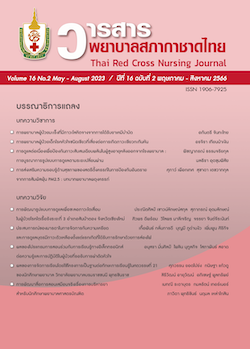Continuing Care and Prevention of Delirium in Elderly Patients Transitioning from Hospital to Home: Integrating Transitional Care Programs
Keywords:
older adults, delirium, continuing care, home health careAbstract
Delirium is an acute brain disorder that causes memory and cognitive impairment. Recently, there has been a higher incidence of delirium reported in older adults both during hospitalization and after being discharged to the home. This article aims to enhance understanding of continuing care with integrated transitional care programs in preventing delirium among older adults when transitioning from hospital to home.
Three groups of clinical symptoms were categorized: hyperactive form, hypoactive form, and mixed form. Causes of the disease include: 1) individual factors, 2) factors directly affecting the brain or causing physiological disturbances, and 3) environmental factors. The role of nurses in providing continuing care to prevent delirium occurring in patients transitioning from hospital to home includes an integrated transitional care program, which is a care program for patients in the hospital stage waiting to transition to home. The six steps of the program consist of: assessment, planning and surveillance, treatment, discharge planning, patient and family education, and post-discharge follow-up visits. In addition, healthcare provider guidelines for promoting cognition and preventing delirium among the elderly while at home include the development of an application monitoring the effects of medication, the use of therapeutic dolls, music therapy, and bright-light therapy.
References
European Delirium Association, American Delirium Society. The DSM-5 criteria, level of arousal and delirium diagnosis: inclusiveness is safer. BMC Med 2014;12:141. doi: 10.1186/s12916-014-0141-2.
Lee J. Risk factors for nursing home delirium: a systematic review. J Korean Gerontol Nurs 2020;22(1):75-83.
Koizia LJ, Wilson F, Reilly P, Fertleman MB. Delirium after emergency hip surgery - common and serious, but rarely consented for. World J Orthop 2019;10(6):228-34.
Manni B, Federzoni L, Zucchi P, Mussi C, Inzitari M, Carda CA, et al. Prevalence and management of delirium in community dwelling older people with dementia referred to a memory clinic. Aging Clin Exp Res 2021;33(8):2243-50.
Sepúlvedaa E, Francob JG, Leundaa A, Morenoa L, Graua I, Vilella, E. Delirium clinical correlates and underdiagnosis in a skilled nursing home. Eur J Psychiatry 2019;33(4):152-8.
Tremolizzo L, Bargossi L, Storti B, Ferrarese C, Bellelli G, Appollonio I. Delirium in your house: a survey during general practitioner-programmed home visits. Aging Clin Exp Res 2021;33(10):2747-51.
Urfer Dettwiler P, Zúñiga F, Bachnick S, Gehri B, de Jonghe JFM, Hasemann W. Detecting delirium in nursing home residents using the Informant Assessment of Geriatric Delirium (I-AGeD): a validation pilot study. Eur Geriatr Med 2022;13(4):917-31.
van Velthuijsen EL, Zwakhalen SM, Warnier RM, Mulder WJ, Verhey FR, Kempen GI. Psychometric properties and feasibility of instruments for the detection of delirium in older hospitalized patients: a systematic review. International Eur J Psychiatry 2016;31(9):974-89.
Skretteberg WH, Holmefoss I, Krogseth M. Delirium during acute events in nursing home patients. J Am Med Dir Assoc 2022;23(1):146-9.
Nitchingham A, Caplan GA. Current challenges in the recognition and management of delirium superimposed on dementia. Neuropsychiatr Dis Treat 2021;17:1341-52.
Shao SC, Lai CC, Chen YH, Chen YC, Hung MJ, Liao SC. Prevalence, incidence and mortality of delirium in patients with COVID-19: a systematic review and meta-analysis. Age Ageing 2021;50(5):1445-53.
Mak W, Prempeh AA, Schmitt EM, Fong TG, Marcantonio ER, Inouye SK, Boockvar KS. Delirium after COVID-19 vaccination in nursing home residents: a case series. J Am Geriatr Soc 2022;70(6):1648-51.
Kosar CM, Thomas KS, Inouye SK, Mor V. Delirium during postacute nursing home admission and risk for adverse outcomes. J Am Geriatr Soc 2017;65(7):1470-5.
Weng CF, Lin KP, Lu FP, Chen JH, Wen CJ, Peng JH, et al. Effects of depression, dementia and delirium on activities of daily living in elderly patients after discharge. BMC Geriatr 2019;19(1):261. doi: 10.1186/s12877-019-1294-9.
Manni B, Federzoni L, Zucchi P, Mussi C, Inzitari M, Carda CA, et al. Prevalence and management of delirium in community dwelling older people with dementia referred to a memory clinic. Aging Clin Exp Res 2021;33(8):2243-50.
Luth EA, Maciejewski PK, Phongtankuel V, Xu J, Prigerson HG. Associations between hospice care and scary family caregiver experiences. J Pain Symptom Manage 2021;61(5):909-16.
Oh ES, Fong TG, Hshieh TT, Inouye SK. Delirium in older persons: advances in diagnosis and treatment. JAMA 2017;318(12):1161-74.
Stollings JL, Kotfis K, Chanques G, Pun BT, Pandharipande PP, Ely EW. Delirium in critical illness: clinical manifestations, outcomes, and management. Intensive Care Med 2021;47(10):1089-103.
Divac N, Prostran M, Jakovcevski I, Cerovac N. Second-generation antipsychotics and extrapyramidal adverse effects. Biomed Res Int 2014;2014:656370. doi: 10.1155/ 2014/656370.
Leinert C, Brefka S, Braisch U, Denninger N, Mueller M, Benzinger P, et al. A complex intervention to promote prevention of delirium in older adults by targeting caregiver's participation during and after hospital discharge-study protocol of the transport and delirium in older people (TRADE) project. BMC Geriatr 2021;21(1):646. doi: 10.1186/s12877-021-02585-0.
Meleis AI, editor. Transition theory: middle-range and situation specific theories in nursing research and practice. New York: Spring; 2010.
McGilton KS, Vellani S, Krassikova A, Robertson S, Irwin C, Cumal A, et al. Understanding transitional care programs for older adults who experience delayed discharge: a scoping review. BMC Geriatr 2021;21(1):210. doi: 10.1186/s12877-021-02099-9.
Kane-Gill SL, Wong A, Culley CM, Perera S, Reynolds MD, Handler SM, et al. Transforming the medication regimen review process using telemedicine to prevent adverse events. J Am Geriatr Soc 2021;69(2):530-8.
Santagata F, Massaia M, D'Amelio P. The doll therapy as a first line treatment for behavioral and psychologic symptoms of dementia in nursing homes residents: a randomized, controlled study. BMC Geriatr 2021;21(1):545. doi: 10.1186/s12877-021-02496-0.
Giovagnoli AR, Manfredi V, Schifano L, Paterlini C, Parente A, Tagliavini F. Combining drug and music therapy in patients with moderate Alzheimer's disease: a randomized study. Neurol Sci 2018;39(6):1021-8.
Giggins OM, Doyle J, Hogan K, George M. The impact of a cycled lighting intervention on nursing home residents: a pilot study. Gerontol Geriatr Med 2019;5:2333721419897453. doi: 10.1177/2333721419897453.
Downloads
Published
Issue
Section
License
Copyright (c) 2023 Srisavarindhira Thai Red Cross Institute of Nursing

This work is licensed under a Creative Commons Attribution-NonCommercial-NoDerivatives 4.0 International License.
เนื้อหาบทความหรือข้อคิดเห็นต่างๆ ในวารสารพยาบาลสภากาชาดไทยนี้ เป็นความคิดเห็นของผู้เขียนบทความ ไม่ใช่ความเห็นของกองบรรณาธิการ หรือสถาบันการพยาบาลศรีสวรินทิรา สภากาชาดไทย






